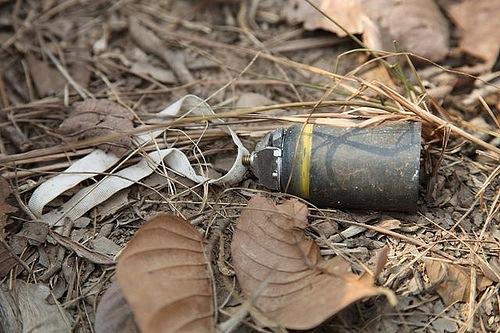Thailand fires cluster bombs into Cambodia
This photo, taken by the Cluster Munition Coalition inside Cambodia, suggests Thailand fired deadly cluster munitions into Cambodia.
Small bombs and land mines are a scourge in mainland Southeast Asia, still littered with unexploded materiel from wars that ended decades ago.
Countries such as Laos, Cambodia and Vietnam are still clearing their land of land mines and cluster bombs. So it's particularly unsettling to see more added to the terrain in 2011.
A watchdog group called the Cluster Munition Coalition has sent Bangkok-based journalists photos said to show fresh cluster bombs on Cambodian soil. The group also claims Thailand's U.N. ambassador admitted in a recent meeting that Thai troops indeed fired cluster bombs into Cambodia during February border clashes.
Let's add clarity to the jargon: a cluster bomb is basically a fireable shell with lots of tiny bombs inside it. Think of a shotgun. Aim it, fire and launch hundreds of tiny destructive pellets towards a general area. Lob a cluster bomb over an area and it breaks apart in mid-air, scattering dozens, hundreds or even thousands of smaller bombs.
Most cluster bomb "bomblets" explode on impact. Some don't. The bombs are despised because they can kill non-combatants — including kids — years after conflicts cease.
And that's why 108 countries signed a convention to ban cluster bombs in 2008. It's a nasty weapon that leaves little unexploded "bomblets" in fields and jungles. There they lie in wait until a farmer steps in the wrong place or a kid mistakes a bomblet for a cool toy.
"These cluster munitions have already robbed two men of their lives, two more have lost their arms and a further five were injured," said Denise Coghlan, who conducted munitions searches for the group. (During the same spell of fighting, Cambodia fired mortars and grenades into Thai territory, killing several Thai villagers.)
According to the Cluster Munition Coalition, this Cambodian cop is among those the wounded by cluster bombs from the Thai side. (Photo taken by Stéphane De Greef, Landmine and Cluster Munition Monitor.)
![]()
For more on why Thai and Cambodian troops are killing each other over a less than two-square mile piece of land, check out our most recent report and video here.
We want to hear your feedback so we can keep improving our website, theworld.org. Please fill out this quick survey and let us know your thoughts (your answers will be anonymous). Thanks for your time!
